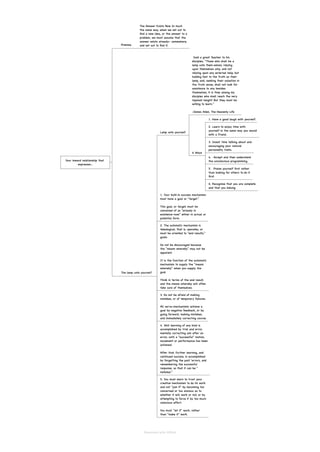Your inward relationship that expresses....pdf
- 1. ‎ Your inward relationship that ‎ expresses... ‎ Premise ‎ The Answer Exists Now In much ‎ the same way, when we set out to ‎ find a new idea, or the answer to a ‎ problem, we must assume that the ‎ answer exists already— somewhere, ‎ and set out to find it. ‎ The lamp unto yourself ‎ Lamp unto yourself ‎Said a great Teacher to his ‎ disciples, "Those who shall be a ‎ lamp unto them-selves, relying ‎ upon themselves only, and not ‎ relying upon any external help, but ‎ holding fast to the Truth as their ‎ lamp, and, seeking their salvation in ‎ the Truth alone, shall not look for ‎ assistance to any besides ‎ themselves, it is they among my ‎ disciples who shall reach the very ‎ topmost height! But they must be ‎ willing to learn." ‎ ‎ -James Allen, The Heavenly Life ‎ 6 Ways ‎ 1. Have a good laugh with yourself. ‎ 2. Learn to enjoy time with ‎ yourself in the same way you would ‎ with a friend. ‎ 3. Invest time talking about and ‎ encouraging your natural ‎ personality traits. ‎ 4.  Accept and then understand ‎ the unconscious programming. ‎ 5.  Praise yourself first rather ‎ than looking for others to do it ‎ first. ‎ 6. Recognize that you are complete ‎ and that you belong. ‎ 1. Your built-in success mechanism ‎ must have a goal or "target." ‎ ‎ This goal, or target, must be ‎ conceived of as "already in ‎ existence—now" either in actual or ‎ potential form. ‎ 2. The automatic mechanism is ‎ teleological, that is, operates, or ‎ must be oriented to "end results," ‎ goals. ‎ ‎ Do not be discouraged because ‎ the "means whereby" may not be ‎ apparent. ‎ ‎ It is the function of the automatic ‎ mechanism to supply the "means ‎ whereby" when you supply the ‎ goal. ‎ ‎ Think in terms of the end result, ‎ and the means whereby will often ‎ take care of themselves. ‎ 3. Do not be afraid of making ‎ mistakes, or of temporary failures. ‎ ‎ All servo-mechanisms achieve a ‎ goal by negative feedback, or by ‎ going forward, making mistakes, ‎ and immediately correcting course. ‎ 4. Skill learning of any kind is ‎ accomplished by trial and error, ‎ mentally correcting aim after an ‎ error, until a "successful" motion, ‎ movement or performance has been ‎ achieved. ‎ ‎ After that, further learning, and ‎ continued success, is accomplished ‎ by forgetting the past 'errors, and ‎ remembering the successful ‎ response, so that it can be " ‎ imitated." ‎ 5. You must learn to trust your ‎ creative mechanism to do its work ‎ and not "jam it" by becoming too ‎ concerned or too anxious as to ‎ whether it will work or not, or by ‎ attempting to force it by too much ‎ conscious effort. ‎ ‎ You must "let it" work, rather ‎ than "make it" work.

